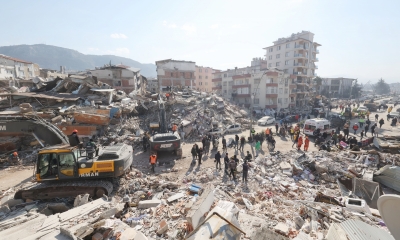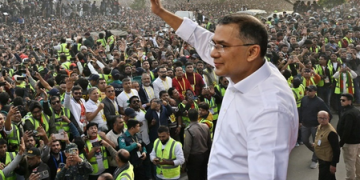New Delhi: The global annual average loss (AAL) in the principal infrastructure sectors due to disasters and climate change currently stands between $301 and $330 billion, according to a biennial report from the Coalition for Disaster Resilient Infrastructure (CDRI).
The inclusion of health and education infrastructure, and building stock, increases that range to $732 to $845 billion — around one-seventh of the global GDP growth in the financial year 2021-2022 — with nearly half of this contingent liability held by the low-and-middle-income countries, the report said.
The low-and-middle-income countries (LMICs), therefore, face a multi-dimensional challenge — a large infrastructure deficit that constrains social and economic development, precarious and poor-quality infrastructure due to deficiencies in infrastructure governance, disaster-related asset loss and damage and service disruption, and a stock of legacy infrastructure increasingly ill-suited to address the challenges posed by climate change and rapid technological change, it said.
“Extreme climate hazards magnify disaster risk, asset loss and service disruption, while existing infrastructure may lose its functionality. Although growing momentum in climate change mitigation is changing the way infrastructure systems are developed and used with a transition to carbon-neutral and carbon-negative development gaining pace in sectors such as energy and transport, the climate change-conditioned global average annual loss (AAL) in infrastructure currently lies between $301 and $330 billion,” the report said.
Launched by Prime Minister Narendra Modi at the United Nations Climate Action Summit in September 2019, the CDRI is an international partnership of countries, organisations and stakeholders that focuses on promoting and enhancing the resilience of infrastructure systems to disasters, particularly those related to climate change.
The report highlighted that 30 per cent of the total global AAL is associated with geological hazards and 70 per cent with climatic hazards.
“In other words, climate change can significantly increase the AAL. While high-income countries could witness an increase in their total infrastructure AAL by 11 per cent, the figure could increase by 12 to 22 per cent in middle-income and 33 per cent in low-income countries,” it said.
As such, climate change will have a significantly greater impact in those countries with large infrastructure deficits, weak infrastructure governance, low fiscal capacity and limited private investment.
Many of the countries faced with the greatest increase in risk due to climate change are situated in Sub-Saharan Africa and the Middle East, the report said.
The CDRI’s biennial report noted that climate change could significantly modify the AAL of hydropower generation in countries where it represents the primary energy source.
“At the upper bound of climate change, the relative AAL of hydropower production could increase from 12.8 to 34.8 per cent in Lesotho and from 6.8 to 32.4 per cent in Costa Rica. In contrast, Paraguay could see a reduction from 4.0 to 1.5 per cent and Norway from 1.7 to 0.4 per cent,” it said.
The report said massive investments in infrastructure over the last 50 years have not been equally distributed.
In high-income countries, the per capita value of capital stock is $200,000 compared to $37,000 in upper-middle-income countries, $8,000 in LMICs and $3,000 in low-income countries, it pointed out.
For example, while Switzerland’s per capita value of infrastructure assets is more than $375,000, Senegal’s is only $4,600, highlighting a difference of almost two orders of magnitude.
Public and private investment in low-income countries has consistently lagged behind middle and high-income countries. Consequently, the gaps in infrastructure investment are widening, constraining social and economic development in the lower-income countries while increasing global inequities. Further, the COVID-19 pandemic either stalled or reversed progress toward many of the sustainable development goals (SDGs), the report said.
Climate change challenges service resilience, the CDRI noted.
Heat waves, for example, may require additional power generation and distribution capacity to cope with increasing demands for cooling. Preventing surface water flooding due to extreme rainfall may require better stormwater drainage assets. Extreme drought may disrupt water supplies, triggering displacement and migration from rural areas due to water scarcity, further straining essential services in urban areas. At the same time, rapid changes in the way services are provided or used, for example, the transition to electric mobility, require new infrastructure while at the same time, leaving behind stranded assets.
The report highlighted that a few low-income countries have the financial capacity to scale their public capital investment to address the infrastructure deficit, allocate sufficient budget to maintain existing infrastructure, and transition to net zero while strengthening asset and service resilience.
They also face difficulties in mobilising private investment as the gaps between high-income countries and the LMICs continue to widen. In 2021, for example, 80 per cent of private infrastructure investments were directed towards the high-income countries, the report said.
Half of these investments flowed into renewable energy generation. Further, investments per capita across North America and Europe were 57 and 41 times, respectively, greater than in Sub-Saharan Africa.
Investments in the high-income countries grew by 8.3 per cent in 2021 but fell by 8.8 per cent across the LMICs. Even among the LMICs, most of the available capital flowed into the middle-income countries. In 2022, the low-income countries received only around 2 per cent of the global foreign direct investment, the CDRI pointed out.
Most of the high-income countries and territories, as well as middle-income countries with large economies, such as India, Mexico and China, have high levels of absolute risk but low levels of relative risk. Their high absolute risk only represents a small proportion of their capital stock and does not threaten their resilience, the report underscored.
Countries such as the Philippines, Bangladesh, Vietnam, Myanmar, Peru, Honduras and Ecuador have high levels of both absolute and relative risk. They can experience large-scale losses that also challenge their resilience, the report said.
In contrast, most Small Island Developing States (SIDS) have low levels of absolute risk due to the small size of their territories and economies but very high levels of relative risk. These are countries that may experience major difficulties absorbing and recovering from loss and damage to infrastructure assets, it added.
PTI






































